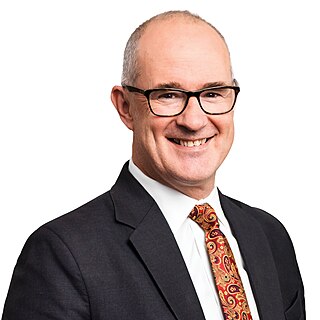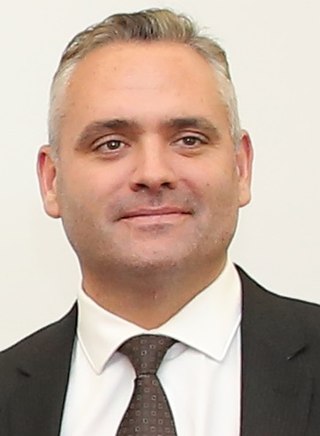
The foreign relations of New Zealand are oriented chiefly toward developed democratic nations and emerging Pacific Island economies. Until the late 20th century, New Zealand aligned itself strongly with the United Kingdom and had few bilateral relationships with other countries. From the latter half of the 20th century, Australia has been New Zealand's most important cultural, economic and military partner. Today, the country participates in several multilateral political organisations, including Asia-Pacific Economic Cooperation, the Pacific Community, and the Pacific Islands Forum. New Zealand has been described as an emerging power; however, such a claim needs to be considered in the context of its medium-sized economy and limited military capability. The country's major political parties have generally agreed on the broad outlines of foreign policy, and the government has been active in promoting free trade, nuclear disarmament, and arms control.

The Minister of Foreign Affairs is a senior member of the New Zealand Government heading the Ministry of Foreign Affairs and Trade and responsible for relations with foreign countries.

David William Parker is a New Zealand Labour Party politician who served as Attorney-General, Minister for the Environment, Minister of Transport and Associate Minister of Finance in the Sixth Labour Government. He previously served as a Cabinet Minister in the Fifth Labour Government, Deputy Leader of the New Zealand Labour Party and Deputy Leader of the Opposition from September 2013 to September 2014, and as interim Leader of the Labour Party from September to November 2014. He represented the Otago electorate at the 47th Parliament and has since served as a list MP.
Jack Arnold Elder is a New Zealand former politician. He was an MP from 1984 to 1999, representing the Labour Party, New Zealand First and Mauri Pacific.

The Australia, New Zealand, United States Security Treaty is a 1951 non-binding collective security agreement initially formed as a trilateral agreement between Australia, New Zealand, and the United States; and from 1986 an agreement between New Zealand and Australia, and separately, Australia and the United States, to co-operate on military matters in the Pacific Ocean region, although today the treaty is taken to relate to conflicts worldwide. It provides that an armed attack on any of the three parties would be dangerous to the others, and that each should act to meet the common threat. It set up a committee of foreign ministers that can meet for consultation.

Dame Frances Helen Wilde is a New Zealand politician, and former Wellington Labour member of parliament, Minister of Tourism and Mayor of Wellington. She was the first woman to serve as Mayor of Wellington. She was chairperson of the Greater Wellington Regional Council from 2007 until 2015, and since 2019 she has chaired the board of the Museum of New Zealand Te Papa Tongarewa.

In 1987, the Fourth Labour Government passed the New Zealand Nuclear Free Zone, Disarmament and Arms Control Act. The Act essentially declared New Zealand as a nuclear free zone. The purpose of the Act was ambitious and wide-ranging: “to establish in New Zealand a Nuclear Free Zone, to promote and encourage an active and effective contribution by New Zealand to the essential process of disarmament and international arms control”.

Campaign for Nuclear Disarmament (NZ) was co-founded in Christchurch, New Zealand in 1959 with the help of Elsie Locke and Mary Woodward. Mabel Hetherington, who belonged to an earlier generation of peace activists from England, was largely responsible for setting up the organization in Auckland when she moved to New Zealand after World War II. With Alison Duff and Pat Denby, Hetherington carried it in Auckland through the 1960s. It was largely from the Campaign for Nuclear Disarmament (NZ) and the Peace Media that Greenpeace New Zealand evolved.

The minister of defence is a minister in the government of New Zealand with responsibility for the New Zealand Defence Force and the Ministry of Defence.
In 1984, Prime Minister David Lange banned nuclear-powered or nuclear-armed ships from using New Zealand ports or entering New Zealand waters. Under the New Zealand Nuclear Free Zone, Disarmament, and Arms Control Act 1987, territorial sea, land and airspace of New Zealand became nuclear-free zones. This has since remained a part of New Zealand's foreign policy.

According to the U.S. State Department, relations between New Zealand and the United States as of August 2011 are "the best they have been in decades." New Zealand is a major non-NATO ally of the United States.

Philip Stoner Twyford is a politician from New Zealand and a member of the Labour Party. He has been a Member of Parliament since 2008. He is the Labour Party MP for Te Atatū.
The Nuclear Free World Policy is a commitment by a bloc of countries known as the New Agenda Coalition (NAC) to shape foreign policy around the goal of "the elimination of nuclear weapons and assurance that they will never be produced again." The policy arose from an 18-point Joint Declaration signed by the Ministers of foreign affairs of Brazil, Egypt, Ireland, Mexico, New Zealand, South Africa, Slovenia and Sweden on June 9, 1998. The signatories of this Joint Declaration became member-states of the NAC, although Slovenia and Sweden subsequently left the Coalition.

The Minister for Arts, Culture and Heritage is a minister in the government of New Zealand with responsibility for arts, culture, heritage, and broadcasting, and is in charge of the Ministry for Culture and Heritage. The position was established in 1975 as Minister for the Arts.

Fletcher Hoporona Tabuteau is a New Zealand politician and former Member of Parliament. He was elected as a list MP for the New Zealand First party from 2014 to 2020 and was deputy leader of the party from 2018 to 2020.

The Minister for Women is the government minister in the New Zealand Government with responsibility for the rights and interests of the country's female citizens. It has been a post in all New Zealand governments since 1984. The Minister leads the Ministry for Women.

The Minister of State Owned Enterprises is the government minister in New Zealand responsible for trading enterprises owned by the New Zealand Government, usually in conjunction with the minister responsible for the industry.

The Minister of Immigration was established in 1872 as the Secretary for Crown Lands and Immigration. The minister appointed was William Fitzherbert but when replaced later in the year by Maurice O'Rorke, the title was changed to Minister of Immigration.

The Minister of Housing is a minister in the government of New Zealand with responsibility for the government's house-building programme. The position was established in 1938 as Minister in charge of Housing, and has most commonly been known as Minister of Housing. Other iterations have included the Minister of Building and Housing, the Minister of Social Housing, and the Minister of Housing and Urban Development.

The Minister of Science, Innovation and Technology is a ministerial portfolio in the government of New Zealand. The minister's responsibilities include leading the science and innovation system and setting the direction for government investment.





















